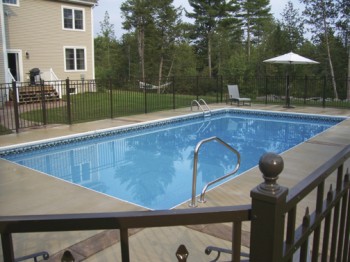Chlorine is the most common way to keep a swimming pool sparkling clean in our region, but what about ozonators and salt generating systems?
Many sources claim that these cleaners are more efficient, keeping your pool cleaner for longer; is it true? Ozone has been used to keep European drinking and pool water clean for decades, but is still somewhat unknown on this side of the Atlantic.
How Does It Work?
An ozonator system takes oxygen from the air and exposes it to UV radiation, creating ozone–a gas molecule made up of three oxygen atoms. The ozone is immediately dispersed into the pool via the plumbing system. Ozonators are available for both above-ground, in-ground, and recessed pools.
What Are Some Benefits?
It’s easy to see that using ozone to clean your pool can be a more natural option. There’s no taste or smell that results from chemicals, as ozone is simply air. So on a larger scale, think of the reduction in possible health effects which can develop from too much chemical exposure. For example, some people experience eye and skin irritation after exposure to certain pool chemicals.
On a somewhat smaller scale, as the ozonator is a machine that is installed near the pool, so there’s no need to store as many potentially dangerous chemicals in your home. You’ll also spend less time testing and chemical balancing, as ozone is neutral.
What Are Some Drawbacks?
The initial investment for an ozonator can be a bit hefty – typically starting around $250, and increasing with pool size. However, the system will pay for itself in chemical savings, and reduced maintenance.
Another drawback to installing an ozone system is that any skimmers, strainers or filters will need more attention. Materials will be broken down faster than with chlorine, and consequently, will end up in these places faster.
Also, ozone is considered a short-term cleaner, while chlorine is a long-term one. Though ozone is much more powerful than chlorine in breaking down matter, its shelf life is limited – this is why ozone is emitted to the pool instantaneously as the system is running.
Making A Decision
Using an ozonator is a great option if you want less harsh pool water. If you are set on maintaining a completely chemical-free pool, some extra vacuuming and wall scrubbing is necessary. Otherwise, algae blooms are still a possibility as their spores stick to surfaces (get more info in our guide to keeping your pool algae-free).
To keep your pool at its cleanest while still being organic, it’s best to use a combination of ozone with a little chlorine or other chemical cleaner. Keep in mind that an effective ozonator can reduce your pool chemical use by about 90%.

